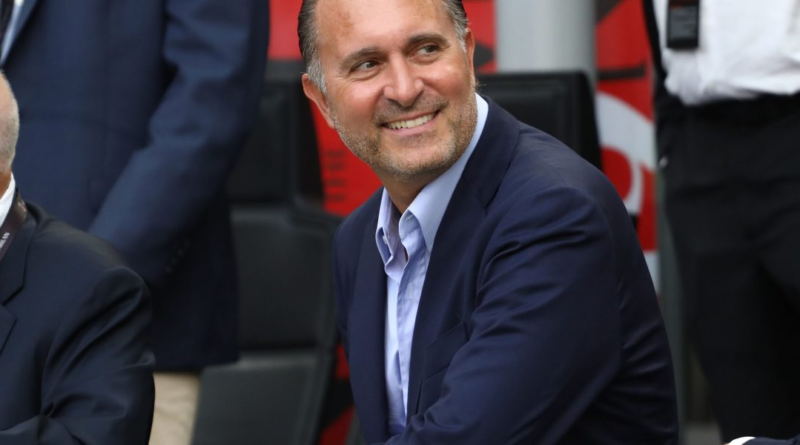'Sports now is no longer a hobby for rich guys': The former Goldman rainmaker-turned-club owner takes a page from his friend Billy Beane’s analytics playbook
Gerry Cardinale has done well in his career: two decades at Goldman Sachs, founding the nearly $10 billion private-equity firm RedBird Capital, and glittering friendships in sports and entertainment that run from George Steinbrenner to Ben Affleck to The Rock.
He’s done huge deals, such as RedBird’s $1.2 billion acquisition of the storied Italian soccer club AC Milan in 2022. But he’s got a message for those who wish to try their hand at owning a team: “Sports now is no longer a hobby for rich guys.”
“Sports is a multibillion-dollar live event entertainment business, and you have to bring relationships and multidisciplinary skill sets across a range of activities to be able to get these things done,” he tells Fortune.
For Cardinale, a prolific investor in sports and media, the bygone era of sports as a vanity project for local magnates is gone. Instead, international competition from global investors of the highest order, each with their own vast troves of capital, mean that even fun things like sports now require serious management.
Cardinale spent 20 years at Goldman Sachs’ merchant bank working on all manner of deals with all kinds of clients, including the New York Yankees and Dallas Cowboys, two teams synonymous with big money. Cardinale helped the Yankees launch the Yankee Entertainment and Sports Network and finance their new stadium. He also has a long relationship with Cowboys owners Jerry Jones, with whom he partnered to start Legends Hospitality, a company that specializes in stadium hospitality. “My model in sports continues to be, and traditionally has been, partnering with a rights holder like a team or a league and building terminal value businesses around those rights,” Cardinale says.
At RedBird, he’s had a knack for merging the worlds of sports and entertainment. For instance, RedBird is an investor in LeBron James’ media firm SpringHill Company, and he helped Michael B. Jordan and Ryan Reynolds invest in Formula 1 team Alpine Racing. Redbird even partnered with The Rock to buy the Xtreme Football League.
Over the last 15 years, soccer has seen a ton of wealth pour into the sport from all over the world: oil money from the Middle East, oligarchics from Russia and Eastern Europe, and all manner of tycoons from Asia and, increasingly, America. And most of these investors have run their teams like businesses, investing hordes of money into securing lucrative sponsors, building world-class infrastructure like stadiums and training grounds, and naturally, signing the game’s best players, often at record-breaking prices. All this to turn what was once a game into a booming business.
Cardinale thinks he can do that with the help of another famous name in his rolodex—Billy Beane. He sees an opportunity for the “moneyball” approach made famous by Beane.
Cardinale brings moneyball to Italy
“Billy opened my eyes to the potential of a creative, company-building investor with an entrepreneurial mind like myself of actually investing in European football despite the risks around the transfer market and relegation,” Cardinale says.
The trouble with the transfer market is how the world’s wealthiest clubs can outspend all their competition, making moneyball-style recruitment even harder. While Cardinale did experience the risk of relegation firsthand after he bought the French club Toulouse FC in 2020 for $15 million, after it had been relegated, Toulouse won promotion back to the French top flight the following season.
It was Beane who managed to convince Cardinale to keep investing in European soccer. “Billy’s view is that moneyball is really quite well served in European football,” Cardinale says.
Beane didn’t grow up playing soccer, but a love for the game blossomed during a 2003 trip to London with his wife. He crossed paths with French soccer executive Damien Comolli, who was a great admirer of his moneyball philosophy. Comolli would eventually get hired by Liverpool F.C., the English soccer team owned by John Henry’s Fenway Sports Group (FSG), which also owns the Boston Red Sox. And here the web of Beane is at work: Henry had been a long-time admirer of Beane’s, even offering to make him the highest paid general manager in baseball history. When Beane turned him down, all Henry did was hire the data-crunching prodigy Theo Epstein, who went on to lead both the Red Sox and Cubs to historic championships. In 2017, Epstein topped the Fortune World’s Greatest Leaders list.
Beane and Henry did come close to consummating their professional relationship in October 2020 when FSG was slated to go public via a SPAC that Beane co-chaired with Cardinale. The deal ended up falling through. But from those connections Cardinale and FSG would continue working together.
In March 2021, RedBird invested $735 million to acquire about a 10% stake in FSG. Cardinale also brought with him a few of his A-list connections, with Lebron James also getting an ownership stake. Much of Cardinale’s plans at Milan echo FSG’s work with Liverpool in reviving a fallen giant. For Liverpool, it took several years before they achieved the on-field success ownership sought. However, the blueprint seems to have worked, with Liverpool winning a Champions League in 2019 and, in 2020, the club secured its first Premier League title in 30 years.
Now with the FSG’s success story at Liverpool already written, Cardinale might be able to speed up the process at Milan. Cardinale has already taken Beane’s roster-building analytics to heart, while trying to improve on them. “Gone are the days where showing up with data…was a competitive advantage,” Cardinale said at a Financial Times conference in 2023. “But the way we use data is differentiated.”
Despite being a finance executive with a penchant for analytics, Cardinale, like his friend Beane, doesn’t disregard the importance of winning on the field. In fact, he sees it as critical to his team’s business success. “On-the-field performance and off-the-field performance are a Venn diagram. They are critically important to each other,” Cardinale says. “That’s what 30 years of investing in sports has taught me, and I think it’s served us well.”




